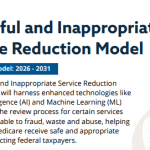
Safe Toys and Gifts Month: Pediatric Safety Campaign Starter
Launch a turnkey Safe Toys & Gifts Month campaign with CPSC and Prevent Blindness toolkits; protect kids, cut injuries, and model pediatric safety leadership.
Home » Archives for Simon Barr » Page 3

Launch a turnkey Safe Toys & Gifts Month campaign with CPSC and Prevent Blindness toolkits; protect kids, cut injuries, and model pediatric safety leadership.

World AIDS Day action guide: Boost HIV testing, equity, and PrEP uptake with turnkey toolkits from UNAIDS and CDC for health-system leaders and teams.

Universal Human Rights Month gives health systems turnkey tools (policies, equity scorecards, UN & WHO kits) to embed patient-rights and close care gaps.

While scalability and compliance drive operational success, it’s satisfaction and trust that determine long-term retention. This deep dive explores how the right utilization management partner helps payers improve relationships with providers, enhance member satisfaction, and strengthen clinical outcomes

Turnkey toolkit for National Impaired Driving Prevention Month; evidence, leadership actions, and NHTSA/CDC resources to curb holiday crash injuries.

The Centers for Medicare & Medicaid Services (CMS) will implement the Wasteful and Inappropriate Service Reduction (WISeR) Model beginning January 1, 2026, through December 31, 2031. This pilot applies to Original Medicare only, not Medicare Advantage, and operates in six states: Arizona, New Jersey, Ohio, Oklahoma, Texas, and Washington.

Celebrate National Rural Health Day with turnkey facts, leadership actions, and NOSORH/CDC toolkits to close access gaps and advance rural equity.

Drive seizure preparedness during National Epilepsy Awareness Month with ready-made toolkits, facts, and leadership actions for enterprise-wide impact.

Pancreatic Cancer Awareness Month resources: stats, leadership actions, and PanCAN toolkits to amplify early detection and equity this November.

The U.S. Food and Drug Administration (FDA) has awarded the first-ever National Priority (NP) Vouchers to nine sponsors as part of its new Commissioner’s National Priority Voucher (CNPV) Pilot Program. These vouchers provide priority review for future submissions, supporting the rapid advancement of treatments in areas of public health importance such as antimicrobial resistance, rare diseases, and domestic manufacturing resilience.